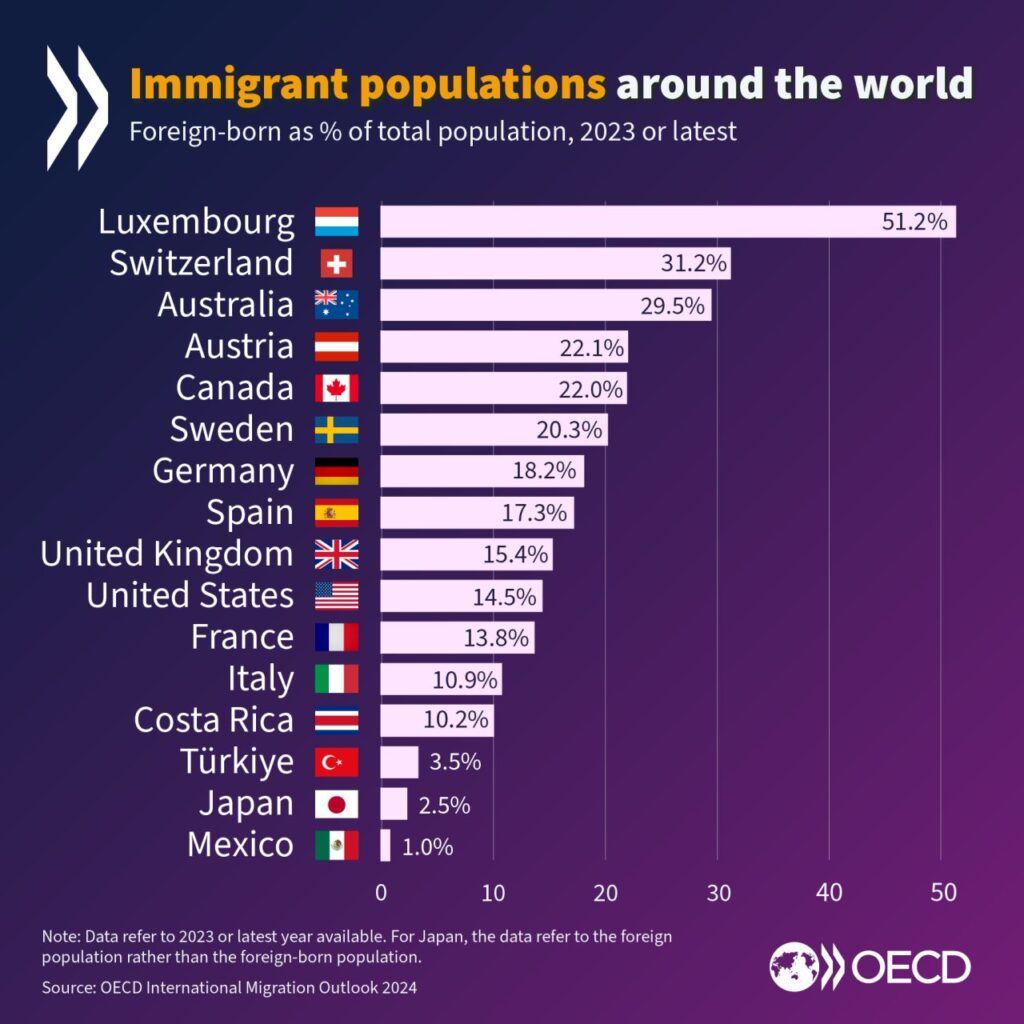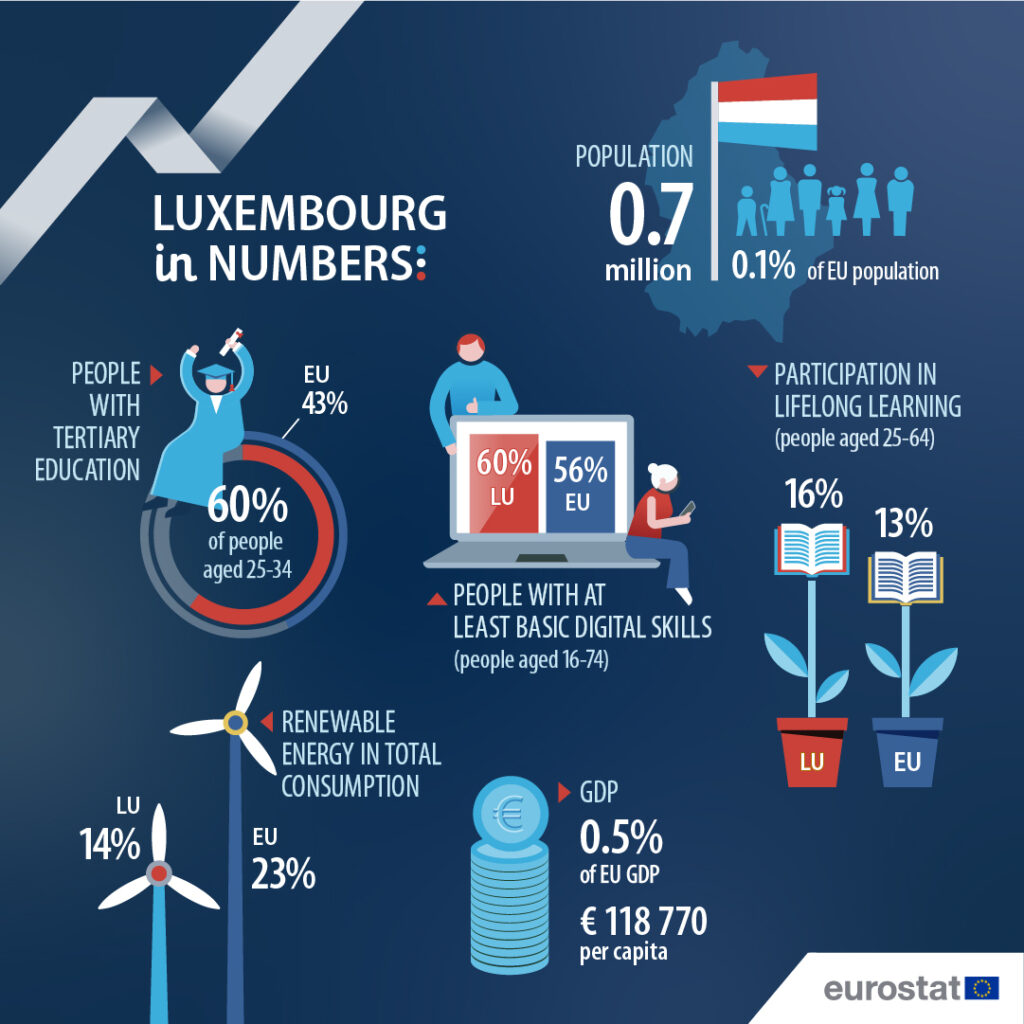Luxembourg becomes the first OECD country with a majority foreign-born population
17 January 2025

Luxembourg’s evolving population
On 2024 International Migrants Day, the OECD released a report unveiling that 51.2% of Luxembourg’s population is foreign-born.
© LMIH
According to the OECD report International Migration Outlook 2024, migration flows to OECD countries hit an all-time high in 2023. In total, 6.5 million new permanent-type immigrants arrived in OECD countries.
Luxembourg’s foreign-born population
Foreign-born residents in Luxembourg account for 51.2% of the population (668,606 total inhabitants in 2023), with a slightly higher proportion of men (51%) compared to women (49%). Looking at the evolution since 2013, Luxembourg’s foreign-born population has increased by 48%.
Taking a closer look, the OECD released Luxembourg’s 2022 figures which showed that the country received roughly 27,000 new immigrants (12% more than 2021) on a long-term or permanent basis . This figure consists of 65% immigrants enjoying free mobility (Schengen), 17% family members (including accompanying dependents), 13% labor migrants and 4% humanitarian migrants. It is also worth noting that 400 permits were issued to tertiary-level international students, the bulk of which attending the University of Luxembourg.

Recent trends in labour market outcomes for migrants
In 2023, most OECD countries (22 of 35) had an increase in the employment rate of migrants, going from an overall of 71.4% in 2022 to 71.8% in 2023. Luxembourg recorded the second highest employment rate for migrants (+10.5% in favor of the foreign-born), only behind Chile with +15.1%.
According to the OECD, the share of Luxembourg’s foreign-born in employment is 60.7% (a percentage calculated as the share of employed foreign-born persons aged 15-64 in the total foreign-born population). This figure leads all OECD countries with Switzerland at a distant second with 33.6%.
This figure of 60.7% translates into roughly 165 thousand foreign-born employed in Luxembourg, with an OECD leading rate of 21,9% working in administrations and ETO (extra-territorial organisations).
Luxembourg is the most attractive European country for international jobseekers
In addition, the 2022 report “Brain gain or drain? How shifts in international job search are accelerating global competition for talent” by Indeed Hiring Lab, ranked Luxembourg as the most attractive destination for international jobseekers. Discover the article in the box below.
An interdisciplinary approach to tackle migration issues
The number of international migrants has increased remarkably in past decades. The prospects are that migrant flows will grow even faster in the near future due to climate change and conflicts. As a result, there is more and more interest among policymakers and society to understand who migrates and why, the consequences for both sending and receiving countries, and how to design better policies that could increase the gains from migration while reducing its potential costs.
The Crossing Borders Research Programme at the Luxembourg Institute of Socio-Economic research aims to shape policy for a more inclusive and sustainable future, while deepening our understanding of the complex dynamics of cross-border mobility, social cohesion and economic growth.
- Learn more about the causes and consequences of cross-border human mobility
- Learn more about brain drain and development
- Learn more about the role of economics in forced displacement and conflict situations in developing countries
Why do researchers choose Luxembourg as a research destination?

In Luxembourg, everyone finds their unique slice of life, thanks to the country’s openness and tolerance
Rana Cömertpay (Luxembourg Institute of Socio-Economic Research)
Read full article to discover Rana’s portrait

While Luxembourg may have a smaller research community compared to larger countries, this compact environment fosters close-knit collaborations and a sense of scientific community, which can be highly advantageous.
Miron Sopić (Luxembourg Institute of Health)
More about Miron’s research path in Luxembourg
Discover more researchers who chose Luxembourg in our series “In Conversation with Young Researchers“











